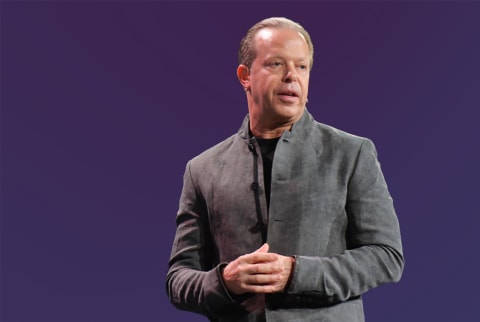But according to New York Times bestselling author Joe Dispenza, D.C., we may have more control over our bodies than we think: All it takes is some mindfulness. Through extensive research using neuroscience and quantum physics, Dispenza says our minds can actually have some control over our physical bodies. The key? It takes shifting from a primitive response to a parasympathetic nervous system response. It sounds quite complicated, but it’s actually a little easier than you might think. Here, Dispenza’s tried-and-true method to change your mindset. Done correctly, you may even support your immune system in the process: “What you fear controls you. We have to learn how to switch that process,” he says. In this case, rather than letting our fears about the coronavirus control us and our actions, we have to learn how to transform it. Here’s how: “Your body is objective,” Dispenza begins. “It doesn’t know the difference between an actual experience in your life that creates an emotion and an emotion you’ve fabricated by thought alone.” What he means is that our bodies cannot differentiate between actual events that make us stressed and the anxious thoughts we have that create stress. To our bodies, the feeling is just stress—no matter what it took to get to that point. So, according to Dispenza, in order to convince our bodies to feel gracious and at ease, we must think calming thoughts and focus on gratitude. It works when we feel stress—why not the other way around? When you change your energy in this way, it can transform you from being a “victim” of your own life to being “the creator” of your own life, meaning, you don’t have to wait for life to simply happen—you can take control of how you feel and act. Take it from Dispenza: “When you use gratitude as a tool, you no longer look for something to happen because you can feel like it’s already happening. You’re caught up in the energy of your future.” It relates back to the previous point—if your body can’t tell the difference between an external stressor and one you’ve created in your own mind, it would see both of them as a similar threat. In order to make sure your immune system is solely focusing on protecting you from those external stressors, it may be best to limit your internal stressors as much as you can. According to Dispenza, the effect is radical: “Changing your fear to gratitude, appreciation, and kindness for just 10 minutes a day, three times a day, can strengthen your immune system by 50%,” he explains. “If you don’t give your power to other people or circumstances, you can be less susceptible to conditions in your environment. Your immune system will say, ‘I got this. I have a lot of energy here.’” Consider it giving your immune system a priority project—if you can control your internal stress load, you can better respond to the environmental stressors you can’t necessarily control, like exposure to a virus. That said, you might want to use the resources you have on hand to cultivate gratitude: Chat with family and friends, grab a journal, do some breathwork—focus on whatever gratitude practice works best for you, and try to transform your mindset. Your immune system might thank you.



